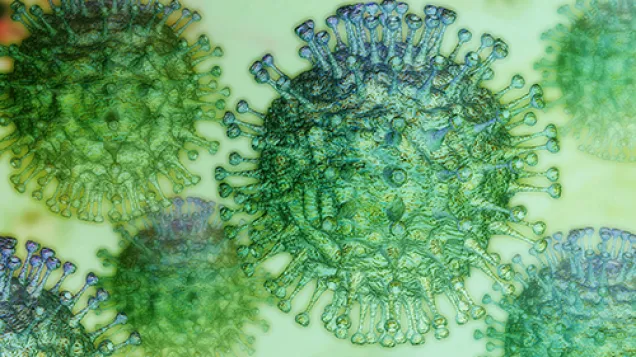COVID-19
COVID-19 is an illness caused by SARS-CoV-2 that emerged in late 2019 and quickly spread. It was declared a global pandemic on 11 March 2020 by the World Health Organization. In May 2023 it was declared that COVID-19 is no longer a public health emergency of international concern. However, the virus continues to circulate in communities and remains a potentially serious risk to health.
Symptoms of COVID-19 can vary in severity from asymptomatic to:
-
fever
-
cough
-
general weakness or fatigue
-
a change in or loss of taste or smell
-
sore throat
-
headache
-
muscle pains
-
diarrhoea
The most severe cases can lead to shortness of breath due to pneumonia and acute respiratory distress syndrome, as well as other complications, potentially leading to death.
The groups most likely to develop severe disease are:
-
People over 60 years
-
Pregnant women
-
People with underlying health conditions such as obesity, diabetes, heart disease, etc.
Most people infected with COVID-19 have asymptomatic or mild to moderate respiratory illness and can recover without needing special treatment.
Some people may experience long-term effects from SARS-CoV-2 infection, known as "long COVID-19." This condition can affect people of all ages, including those who initially had mild symptoms.
SARS-CoV-2 spreads mostly through respiratory droplets that carry the virus, coming straight from someone infected, who sneezes, coughs, talks, sings, or even just breathes near other people. Virus-containing particles can be inhaled or deposited in the nose and mouth or on the eyes.
Although the virus can survive on some surfaces for up to several days, the amount of viable virus declines over time and it is rarely present in sufficient amounts to cause infection after a few days.
Transmission from one infected person to another can start two days before the infected person even begins to show symptoms. In addition, it usually takes five to six days for someone to start showing symptoms after being infected. However, this can vary from one day to two weeks.
The most effective way to prevent COVID-19 is vaccination. There are currently 8 vaccines authorised by the European Union. COVID-19 vaccines have been shown to be very effective in reducing the risk of infection and severe disease from SARS-CoV-2 infection.
The main treatment for most patients with severe disease is supportive care, which is often highly effective, and antiviral medication (monoclonal antibodies and/or available antiviral drugs) where appropriate.
In addition to vaccination, there are other ways to protect ourselves and others and reduce the spread of the SARS-CoV-2 virus such as:
- avoiding close contact with sick people
- washing or cleaning your hands frequently
- avoiding touching your eyes, nose or mouth.
If you are experiencing symptoms, there are also measures to avoid infecting the others:
- maintain good respiratory hygiene and cough etiquette
- wash or clean your hands frequently
- surface and object cleaning
- increased ventilation
- stay home from work or school and limit contact with others
- face masks: wearing a face mask should be considered in crowded settings where physical distancing is not possible.



